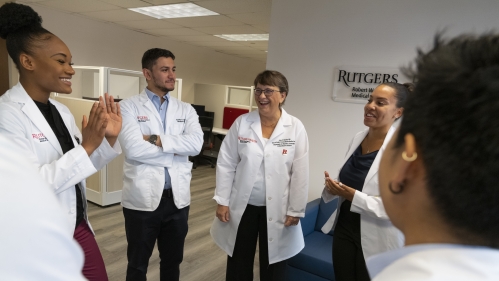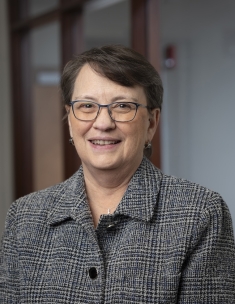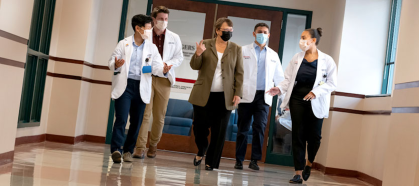
A Publication for Alumni & Friends of Rutgers Robert Wood Johnson Medical School

Meet Dean Amy P. Murtha, MD

For maternal-fetal medicine specialist Amy P. Murtha, MD, returning to the Northeast to serve as dean of Robert Wood Johnson Medical School feels like a homecoming.
A native of New City, N.Y., Dr. Murtha was most recently a professor and chair of the Department of Obstetrics, Gynecology and Reproductive Services at the University of California, San Francisco (USCF), the largest obstetrics department in the country. Moving 3,000 miles to take over the helm of the medical school was an easy decision, however.
“This is home. This is where my family and friends are,” says Dr. Murtha, a self-proclaimed “volleyball mom” with two adult daughters. “This organization is at a pivotal moment. It’s been through a lot over the last 15 years. We have an incredible opportunity to transform the direction of this school and do something special for New Jersey.”
An accomplished researcher, Dr. Murtha assumed the role from Robert L. Johnson, MD, FAAP, the dean of Rutgers New Jersey Medical School who served as interim dean at Robert Wood Johnson Medical School since 2019.
East Coast Roots
The middle of five children, Dr. Murtha was attracted to medicine at an early age. After graduating from high school, she enrolled in the physician assistant program at King’s College in Wilkes-Barre, Pa. However, she soon came to the conclusion that she wanted to play a larger role in patients’ lives.
“I knew I wanted to do something in healthcare, but I didn’t think I had the endurance or resources for medical school,” explains Dr. Murtha. “But when I started my clinical rotations, I began to more deeply understand the impact I could have if I went to medical school. For me, I felt like I could contribute in a more significant way as a physician.”
She briefly practiced as a physician assistant in New York City before being accepted to the Philadelphia-based Medical College of Pennsylvania, now the Drexel University College of Medicine. There, she found her calling.
“I fell in love with labor and delivery,” she recalls. “It’s an incredible adrenalin rush, an intimate and profound experience. Most times, things go well and it’s joyous, and then sometimes the experience is quite tragic. It’s a unique balance.”
Establishing Reputation in Clinical Research
Dr. Murtha completed a residency in obstetrics and gynecology and a fellowship in maternal-fetal medicine at Duke University Medical Center in Durham, N.C. During her fellowship, she dabbled in clinical research, discovering that she found the work exciting. A few years later, when there was a leadership vacuum in the school’s perinatal research lab, she assumed the role—a decision that sparked a passion for translational research that would change the trajectory of her career.
“I had no lab training but had research questions I wanted to explore and had the opportunity to study with the department’s senior lab technician,” Dr. Murtha explains.
Through this experience, Dr. Murtha learned more about research techniques and refined her approaches to collecting and analyzing data. She parlayed this expertise into the creation of a two-credit, master’s-level course in molecular biology research that she taught for 18 years, attracting students from around the globe.

“Running the course was an enormous amount of work but incredibly satisfying,” she says. “Through the workshop, clinical fellows who were inexperienced in the lab gained the knowledge to do bench research and use lab technology.”
During her time at Duke University, Dr. Murtha also served as a professor in the Department of Obstetrics and Gynecology and Department of Pediatrics and vice chair for research in obstetrics and gynecology. In addition, she established and led the Duke Clinical and Translational Science Institute’s Clinical Research Unit and raised the department’s National Institutes of Health’s funding ranking from No. 57 to No. 17.
A skilled academic administrator, Dr. Murtha brings to Robert Wood Johnson Medical School a wealth of experience in clinical management. Currently, her research focuses on preventing premature births and identifying the best ways to diagnose and care for patients at risk for preterm birth. Similarly, the medical school is a national advocate for increasing public and professional awareness of pregnancy-related deaths. In fact, its advocacy prompted a New Jersey resolution that established Jan. 23 as Maternal Health Awareness Day in the state, the first of its kind nationwide. In addition, Robert Wood Johnson University Hospital, New Brunswick—the principal teaching hospital for the school—was recently named to Newsweek’s 2022 list of Best Maternity Care Hospitals. With a firm foundation on which to grow, Dr. Murtha plans to further the school’s reputation as a nationally ranked, research-intensive organization.
Improving Opportunities—and Outcomes—for Underserved Populations
Dr. Murtha plans to continue advancing the school’s diversity, equity, and inclusion aims to provide more opportunities to underrepresented communities. True healthcare equity requires a two-pronged approach, she says: breaking down the barriers that prevent trainees and faculty from being successful in academic structures that have historically marginalized certain populations, while also working to make the delivery of care equitable.
“You can’t do one without the other,” Dr. Murtha explains. “Once we break down barriers, we need to create the opportunities for doctors and healthcare providers to work in the spaces where they can make an impact in the community. Those are two different buckets of work, and my goal is to support and advance these initiatives, because I don’t think you can improve health outcomes unless your workforce is able to provide culturally sensitive care.”
Supporting the Physicians of the Future
When it comes to training aspiring physicians, the new dean has a deep interest in mentoring both students and faculty in the endeavor. She often asks medical students why they chose their career paths and tries to help them uncover their clinical interests. Most physicians-in-the-making experience numerous challenges just to get to medical school, and these challenges often inform their career choices.
“This is a transformational time in their lives,” she explains. “Students have a vast array of choices in front of them. They need to be fully engaged in all opportunities to see which ones resonate. Then, armed with that knowledge, they can decide how to make their passions part of their life’s work.”
Rutgers Robert Wood Johnson Medical School is at a pivotal moment. It’s been through a lot over the last 15 years. We have an incredible opportunity to transform the direction of this school and do something special for New Jersey.
Amy P. Murtha, MD
Dean
Her advice for incoming medical students is simple: Get involved.
“The next four years will be incredibly exciting, stressful, and joyful,” she advises. “Take advantage of every opportunity presented to you and see what lights your fire.”
Dr. Murtha also believes one of the best ways to support medical students is through implementing standardized approaches to delivering quality care that are reasonable and sustainable.
“Delivering care is a little more confusing and complex in a post-COVID world,” Dr. Murtha explains. “The way we’ve been asked to deliver healthcare over the past three years has placed an incredible burden on providers and staff. I see and truly appreciate how tired and burned out folks are, and I believe faculty and staff in academic environments have been uniquely burdened in ways we don’t fully appreciate yet.”
With provider satisfaction on the decline, supporting future caregivers in a post-COVID world will likely require a new approach. And while Dr. Murtha admits she isn’t clear on what the right “formula” is, she is clear that an adjustment is necessary to ensure current and future physicians feel heard and supported at work.
The Vision Ahead: Your Input Is Requested
While Dr. Murtha has several goals for Robert Wood Johnson Medical School, she is reticent to place her stamp on an overarching vision for the organization. Instead, her approach to developing a future-stated goal is a democratic one.
“I plan to take my time getting to know our faculty, students, trainees, staff, and alumni, hearing what their passions are and what they’re hoping to accomplish in their careers. Then we’ll circle back to develop the collective vision of the organization with intention and strategic planning,” she says. “Through collaborative dialogue and preparation, we can positively influence health professions training and together create a healthier state for the residents of New Jersey and beyond.”
